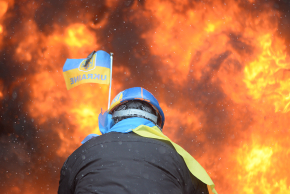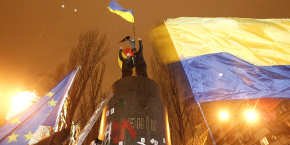by David Finkel
May 7, 2014
The following is intended as a brief followup to the editorial in the new issue of Against the Current (issue 170), where we predicted that the Ukraine crisis and the international tension surrounding it “will not rupture the web of economic connections and mutual interests — especially Europe’s dependence on Russian natural gas, and Russia’s reliance on western investment and technology and the global financial system — that make today’s situation so different from the political-military conflicts of the Cold War.”
Speaking for myself here, I still believe this assessment is valid, but the conflict – especially with the horrific events in Odessa and now an impending full-scale battle for Slovyansk – has spiraled beyond the editors’ anticipation when we were mainly looking at the Russian annexation of Crimea. External and internal forces are pushing the envelope in what’s become a deadly game we might call “Ukrainian roulette.”

From the vantage point of outside observers, we can’t pretend to judge the competing narratives of what happened in Odessa (for one gripping account, see here and a further commentary here — but we don’t know the full story by any means).
A few points, however, do seem clear regarding the context and background of this explosion. First, we may safely assume that the accusations Moscow and Washington are lobbing at each other – that the CIA and U.S. military operatives are involved in Ukraine’s military campaign in the east, and that Russian agents have assisted local “self-defense militia” seizures of town centers and police stations – are largely accurate, while each is lying about its own role.
Second, we must be clear that the expansion of NATO to Russia’s borders – mainly during the 1990s, when Russia was too weak to do anything about it – was a dangerous provocation that would inevitably produce a counter-reaction. By humiliating and threatening a vanquished former superpower rival, NATO pretty much ensured it would reap a whirlwind sooner or later – and if anything ensured this outcome, it was the notion of eventually incorporating Ukraine into NATO as well.
Third and perhaps most important immediately, events on the ground appear driven by fear all around. As Ukraine’s economy verges on collapse, in the east the popular fear is that the European Union’s “reforms” will turn their industrial base, what’s left of it, into a rusted-out wasteland. In western Ukraine, the great fear is that “federalization” (fragmentation) of the country by Russian proxies will perpetuate the misery of poverty, corruption and rule by oligarchs.

Both sets of fears, which seem entirely well-founded, are now overlaid by toxic appeals to nationalism and linguistic identities. That would explain why extreme rightwing nationalist forces, on both sides, attract popular support which they would never receive otherwise. But none of these elements offer any solution to Ukraine’s crisis or to maintaining its fragile integrity as a unified state. They point to the danger of Ukraine becoming the next Yugoslavia.
Ukraine cannot survive either as a NATO protectorate under the European Union’s savage economic dictates, or as a weak confederation of regional fiefs pulled apart and picked off by Russia and its proxies. Its future depends on the emergence of internal forces with a positive social program that can overcome the spreading waves of fear and hatred. If the international left can contribute anything to making such a development possible, it must be by calling for an end to all external intervention and an immediate cease-fire by all military and militia forces.
At this moment, despite the mounting death toll in Odessa, Slovyansk and elsewhere, it doesn’t appear that Russia intends to invade, or that U.S.-European sanctions are intended to bite into the heart of Russia’s energy export sector. Russia’s appetites on Ukraine must be constrained by the cautionary maxim “you break it, you own it” as the United States so disastrously learned in Iraq, while western powers know too well the costs of hitting Russian corporations – not merely the personal accounts of oligarchs who own them – that supply everything from Europe’s natural gas to the United States’ rocket launchers.
Nonetheless, the crisis is closer to the point where one explosion or tactical miscalculation might overtake the rational calculations of imperial state interests, on which the analysis in the ATC editorial statement was premised. We don’t know what the consequences of that would be, and we don’t want to find out.
David Finkel is a Solidarity member in Detroit, and an editor of Against the Current. For highly recommended additional reading see here.

Comments
One response to “Ukraine’s Spiraling Crisis”
I have a couple of in-depth analyses on the Ukraine events, at:
Good for the Gander:Ukraine's Demise Accelerates, and Charge of the Right Brigade:Ukraine and the Dynamics of Capitalist Insurrection